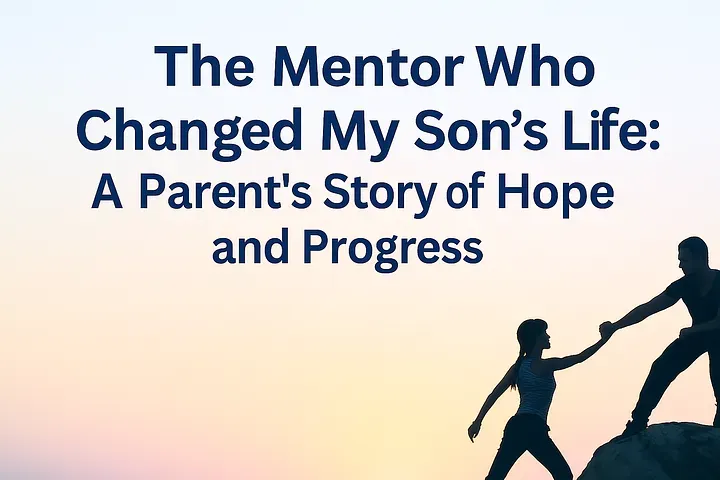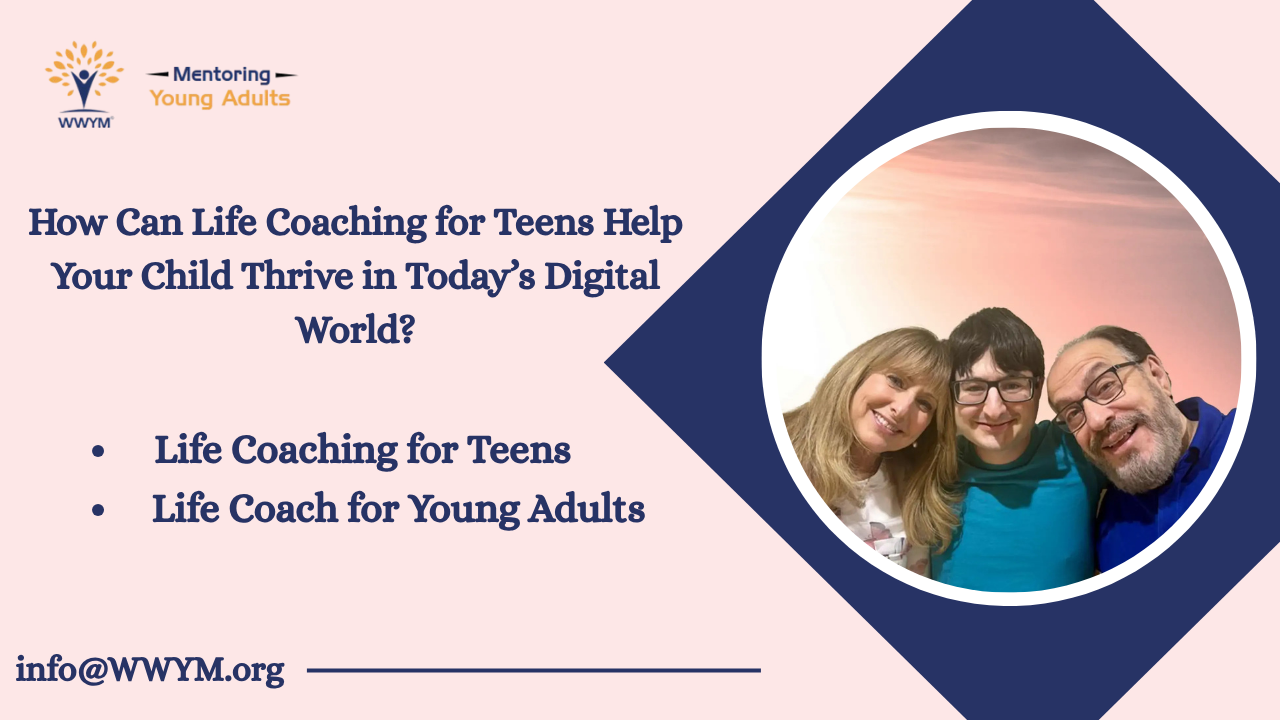What If Your Teen Had a Life Coach Instead of a Therapist?

The Modern Struggles Teens Face
Teens today live in a pressure cooker. With academic expectations, social media perfectionism, and the confusing bridge between childhood and adulthood, it’s no surprise so many feel lost, anxious, or “stuck.” Parents try everything—counselors, therapists, even switching schools—but what if the answer wasn’t another diagnosis or prescription?
What if, instead, your teen had a life coach—someone who didn’t see them as broken but as someone brimming with untapped potential?
Therapy vs. Life Coaching — What’s the Difference?
Therapy often focuses on diagnosing and treating past or present emotional problems. It’s important—but not always the right fit for every teen. Life coaching, especially the model used at Mentoring Young Adults, is future-focused. It’s about empowerment, guidance, and skill-building. Instead of “what went wrong?” the question becomes: “Where do we go from here?”
The Rise of Teen Life Coaching
Why Traditional Therapy Might Not Resonate with Teens
Let’s be real—many teens don’t connect with therapists. They may feel judged, misunderstood, or simply bored with the clinical process. Life coaching flips that. It’s conversational, informal, and feels more like talking to a trusted guide than a doctor.
Life Coaching for Teens: A New Era of Mentorship
Life coaching for teens isn’t just about goal-setting; it’s about transformation. It’s mentoring—personal, empowering, and deeply human. At its core, it builds life skills, self-esteem, and emotional resilience. Teens don’t need a lecture—they need someone who gets them.
Meet the Mentor: Ken Rabow’s Revolutionary Approach
From Music Teacher to Mentor’s Mentor
Ken Rabow wasn’t always a mentor. He started as a middle school music teacher, where he saw firsthand how many teens were struggling quietly. That sparked something. After a life-changing accident, he pivoted into full-time mentoring, creating a system that now supports teens worldwide.
The Origin of the Mentoring Young Adults Program
Ken founded Mentoring Young Adults with a mission: to help teens and young adults overcome challenges such as anxiety, isolation, and failure to launch. What started organically is now a structured program that empowers both mentees and their parents.
Real-Life Story: When Mentoring Changed Everything
Jason’s Journey from Isolation to Empowerment
Jason was 17, stuck in his room for most of the day, failing classes, and refusing therapy. His parents were desperate. Enter mentoring. Within weeks, Jason began setting small goals—going outside, texting a friend back, attending one class. In six months? He was working part-time, enrolled in community college, and smiling again.
The Shift from “What’s Wrong With Me?” to “What’s Next for Me?”
This is the magic of life coaching. Jason didn’t need a label—he needed direction, someone to walk beside him, not in front of him. Mentoring gave him that.
Addressing Core Issues Through Mentoring
Anxiety: The Silent Struggler
From test anxiety to social anxiety, teens today face countless invisible barriers. Life coaching doesn’t just address anxiety—it transforms it into strength, step by step.
School Failure and Academic Burnout
A teen who’s failing in school isn’t lazy. Often, they’re overwhelmed, anxious, or unmotivated. Mentoring identifies the why and helps them build a new way forward.
Communication Issues and Social Disconnection
Teens glued to their screens often lose real-life social skills. Life coaches help rebuild those skills with empathy and encouragement, not shame.
Practical Benefits of Life Coaching Over Therapy
Personalized Life Plans
Each teen gets a roadmap tailored to their goals, struggles, and personality. There’s no one-size-fits-all.
Action-Oriented Sessions
It’s not just talking—it’s doing. Every session concludes with practical steps to take before the next one.
Confidence Through Small Wins
Mentoring focuses on micro-successes. One small win leads to another, and soon, teens start believing in themselves again.
Inside the Mentoring Process
The Safe Space Teens Crave
Unlike formal therapy rooms, mentoring sessions feel safe, relaxed, and real. That comfort opens doors to change.
Micro-Success Strategy Explained
Success doesn’t have to mean a 180-degree turnaround overnight. A micro-success could be as small as sending an email or taking a walk, and each one builds momentum.
Parent Involvement Without Interference
Parents aren’t sidelined—they’re empowered. Programs like the Parent Mentoring Workshop teach you how to support your teen without micromanaging.
Mentoring Options for Every Family
Parent Mentoring Workshop
Perfect for parents trying to bridge the gap. Learn how to truly communicate and motivate your teen, even if they resist help.
Resident Mentoring Program
For teens who need hands-on support tackling issues like anxiety, isolation, or school failure. Starting at just $99 per hour.
Master-Level Mentoring for Complex Challenges
Includes support for high-functioning autism, mental health concerns, and more. This is top-tier mentoring for teens and young adults with deeper struggles.
How It Compares to Therapy in the Real World
Long-Term Results Without the Clinical Setting
Therapy helps with deep-rooted trauma. But when the goal is to launch your teen into adulthood, life coaching is often more practical, relatable, and results-driven.
Teens Talk: What They Prefer and Why
Many mentees report feeling “seen” and “heard” by their mentors in a way they never did in therapy. That trust becomes the launchpad for growth.
Becoming a Mentor Yourself
Training Programs that Empower Adults
Ken Rabow doesn’t just mentor teens—he trains you to do it too. Whether you're a parent, teacher, or just passionate about youth, his system turns caring adults into effective mentors.
The Ripple Effect: One Trained Mentor, Many Transformed Lives
One mentor can change the life of one teen. Ten mentors? That’s a movement. And the world desperately needs it.
Common Myths Debunked
“Only Therapists Can Help My Child”
Not true. Coaches aren’t therapists—but they are trained guides. Sometimes that’s exactly what a teen needs.
“Mentoring is Just a Fancy Word for Talking”
Wrong again. Mentoring is actionable, strategic, and results-based. It’s not about venting—it’s about evolving.
When is Therapy the Right Choice?
Understanding the Boundaries of Life Coaching
If your teen is dealing with trauma, self-harm, or severe depression, therapy is essential. Coaching and therapy are not interchangeable, but they can be complementary.
Working in Tandem: Coaching + Clinical Care
Some families use both. A therapist focuses on mental health, while a mentor builds life skills. Together? It’s a powerhouse support system.
The Future of Teen Support: Coaching as the Norm?
Bridging the Gap Between Emotional Wellness and Personal Development
The world is changing. Our teens need more than diagnoses—they need direction. Life coaching is the bridge between emotional safety and real-world success.
Teen Voices in the Coaching Revolution
Increasingly, teens are seeking mentors, rather than therapists. They don’t want to be “fixed”—they want to be guided. That’s the future.
Reimagining the Support System for Teens
Imagine a world where teens aren’t judged or labeled—but mentored. Where instead of waiting for them to break, we build them up before they fall. Life coaching isn’t a replacement for therapy, but for many teens, it’s the path they actually want to walk. And when they’re ready to walk it? We need to be ready to guide them.
FAQs
❓ 1. How is life coaching for teens different from therapy, and is one better than the other?
Life coaching and therapy serve different, often complementary purposes. Therapy traditionally focuses on mental health diagnoses, past traumas, and emotional healing. It’s essential for teens dealing with severe depression, trauma, or self-harm. Life coaching, by contrast, is not a clinical approach. It’s forward-facing and focused on personal development, confidence, and building life skills.
Rather than asking “what’s wrong?” life coaching asks, “what’s next?” If your teen is struggling with motivation, anxiety, disconnection, or failure to launch—but isn’t in crisis—a mentor can offer a practical, hopeful path forward. Some families even use both, with a therapist focusing on emotional health and a mentor helping to build structure, set goals, and foster self-belief.
❓ 2. My teen already refused therapy—why would they agree to mentoring?
That’s a common and powerful question. Many teens reject therapy because it feels clinical, formal, or like something being done to them. Mentoring feels different. It’s informal, conversational, and rooted in trust rather than assessment. Teens often say mentors feel like someone who “gets them”—not someone who sees them as broken.
Instead of focusing on what’s wrong, mentors help teens focus on what they want to achieve. And because it’s structured around small wins and action steps, mentoring builds momentum. Once a teen experiences even a tiny success—texting back a friend, showing up to one class—their resistance often turns into curiosity, and curiosity into progress.
❓ 3. What kinds of issues can a teen life coach help with?
A qualified teen mentor can support a wide range of challenges, including:
- Academic burnout and school avoidance
- Social withdrawal or screen overuse
- Mild to moderate anxiety
- Low motivation or confidence
- Difficulty communicating or building friendships
- “Failure to launch” patterns
- Goal-setting and life planning
For teens facing more complex issues like high-functioning autism or chronic anxiety, master-level mentoring programs are available. If the issue is rooted in unresolved trauma or clinical depression, life coaching should be paired with therapy. But for many teens, coaching is the missing piece that helps them apply what they’ve learned in therapy, or build themselves up from stuck to strong.
❓ 4. Will mentoring work if my teen doesn’t want help?
Resistance is natural. Most teens don’t ask for support, but that doesn’t mean they don’t need it. A good mentor knows how to start where the teen is, not where adults wish they were. That might mean starting with music, gaming, or humour, not lectures. The key is building a relationship that feels safe and non-judgmental.
Programs like Ken Rabow’s are built around this understanding. Instead of demanding transformation overnight, they begin with “micro-successes”—tiny, achievable wins that build trust and confidence. Once a teen experiences those small victories, they often become more open to mentoring—and eventually, more open to their own growth.
❓ 5. What does a typical mentoring session look like?
Mentoring sessions are tailored to the teen, they are online, and last 60 minutes, and include:
- A safe, informal conversation over Zoom in the comfort of their safe space
- Identifying short-term, achievable goals (e.g., attending one class, calling a friend, putting away clean clothes, checking emails, etc.,)
- Practical strategies to move forward, including daily routines and learning to use a calendar
- Celebrating even small wins to build motivation
Unlike therapy, which may focus on reflection and emotional processing, mentoring is action-oriented. The session ends with the teen knowing exactly what they’ll do next—and feeling supported as they take that step.
❓ 6. What’s the role of parents in the mentoring process? Will I be involved?
Absolutely. One of the most powerful aspects of the mentoring model is empowering parents. Parents are supported through tools like: ongoing mentor-parent emails, parent time Zoom calls, and the Parent Mentoring Workshop, which teaches how to encourage your teen without controlling them.
You’ll learn how to avoid common pitfalls, such as micromanaging, and how to listen free of judgment. Additionally, you'll discover how to create a supportive environment at home that fosters growth. Your role is vital, but mentoring teaches you to play that role more effectively, even when your teen resists help.
❓ 7. Is mentoring just for struggling teens, or can it help motivated ones too?
Mentoring isn’t just about crisis—it’s about potential. While many teens come to mentoring feeling anxious, lost, or unmotivated, others use it as a tool for growth. Teens with strong interests but no clear direction benefit greatly. So do those transitioning from high school to adulthood and needing help with career planning, independence, or emotional resilience.
In short, mentoring helps any teen ready to grow, whether they’re stuck or simply searching.
❓ 8. How long does mentoring take to “work”?
There’s no fixed timeline, because each teen is unique. But you’ll often see changes within weeks. These might be small at first: texting back a friend, showing up to class, and expressing themselves more. But over time, those micro-successes add up.
Some teens work with a mentor for a few months, while others work with them for a year or longer. The goal is never dependency. It’s about building enough inner strength that your teen can take ownership of their future with confidence.
❓ 9. What qualifications do mentors have? Are they licensed?
Mentors are not licensed therapists, and they don’t diagnose or treat mental health disorders. Instead, they are trained in Ken Rabow’s life coaching techniques, goal-setting strategies, communication skills, and youth development—a rigorous one-year course.
In Ken’s system, mentors undergo specific training to understand the inner workings of young adults, master non-judgmental listening, and develop tools to guide teens toward change. Many mentors are former educators, coaches, or professionals passionate about youth empowerment.
❓ 10. Is life coaching affordable? How does the cost compare to therapy?
Mentoring programs vary in cost. For example, Resident Mentoring Programs start at $99 per hour, often less than a private therapy session. More advanced programs for complex needs may cost more, but they include customised plans and higher-level support.
Importantly, many families find mentoring to be more cost-effective long-term because it helps teens take actionable steps toward independence, education, and employment. Instead of ongoing therapy with unclear outcomes, mentoring focuses on building a future and measuring progress session by session.
❓ 11. What if I want to become a mentor myself? Can parents or educators be trained?
Yes—and this is a powerful option for adults who want to support not only their own child but also others. Ken Rabow offers Mentor Training Programs for parents, educators, coaches, and community leaders. The training equips you with the same tools and techniques used by professional mentors.
One trained mentor can change and inspire so many lives over time. Whether you use it professionally or to support someone close to you, the ripple effect is real—and much needed in today’s world.
❓ 12. Is life coaching the future of teen support?
It’s not about replacing therapy—it’s about expanding the support system. Teens today don’t just need diagnoses; they need direction, life skills, and belief in their ability to grow. Coaching answers that call.
In many ways, mentoring is becoming the bridge between emotional wellness and real-world readiness. It speaks a language teens understand: human connection, action, and possibility. As more families discover its power, it may well become the norm, not the exception.
Note: IndiBlogHub features both user-submitted and editorial content. We do not verify third-party contributions. Read our Disclaimer and Privacy Policyfor details.




